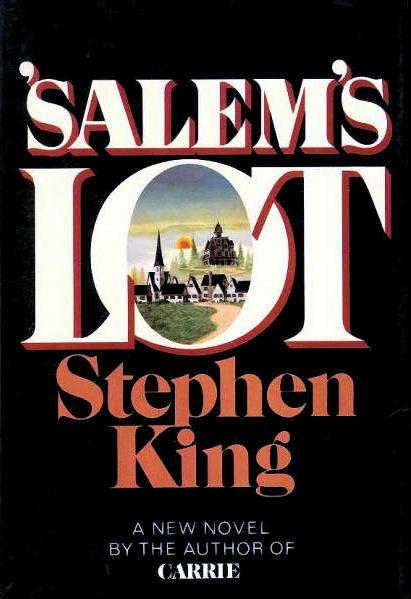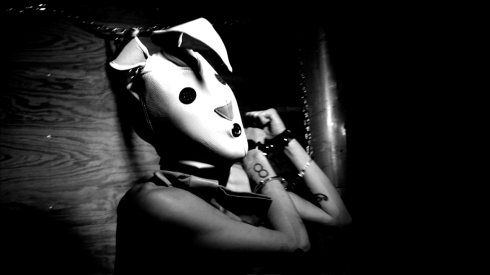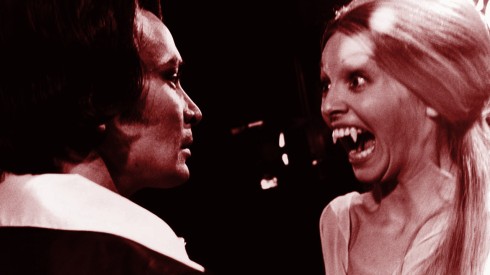Written By: Stephen King
Published By: Doubleday
`Salem’s Lot is a novel that asks a simple question: What happens when vampires descend upon a modern American village filled with a bunch of simple-minded idiots? As such, it is a sort of Americanized adaptation of Bram Stoker’s classic Dracula as well as some considerably more pulpy rags. It follows the novelist Ben Mears during his pit-stop in the town bearing the novel’s namesake. He seeks to rent out the nefarious Marsten mansion on the outskirts of town so that his latest novel may be inspired by its evil atmosphere and is surprised to learn that he was already outbid not too long ago by a suspiciously reclusive chap only named Mr. Barlow. This is a surprising turn of events because the house has stood derelict and abandoned for many decades. Resigned, he holes up in a local boarding house, meets a girl, and is thrust into some kind of Eldritch horror as the town begins to decay from the inside in conjunction with increased activity at the maleficent mansion that broods over the town. Did I mention the mansion was evil?
It’s been said that Stephen King regards this, his second novel, as one of his favorites. I’m inclined to agree. Unlike his comparatively trashy debut effort Carrie, this novel has been crafted with much more care and restraint. Characters are given plenty of opportunities and time to carefully develop into a rich and varied cast of unbelievers who are slowly persuaded to take action against phantasmal forces far beyond the borders of modern reasoning, but in a more modern setting. Even the town gets in on this development, beginning as a little bustling burg that hesitantly degenerates into a dilapidated and sad shadow of its former glory: no doubt a commentary on the ongoing and steady dissolution of the pastoral part of the American Dream. A bittersweet ending, at best.
However, I still struggle a little with King’s writing. Throughout the novel, it’s very clear that the talking heads one encounters are just various bodies with Stephen King’s face attached to them. There are often little throw-away lines that characters say or think, perhaps intended as a natural response to the situation and whatever emotions they may imply to give them some depth; but they don’t feel natural or organic at all. More like cheesy. For instance, very early on in the novel when Ben and Susan meet for the first time in the park, he throws out this strange suave remark: “Of such inconsequential beginnings dynasties are begun,” which is a very obvious wink at the reader that shit is going to be thrown down eventually, but at that very moment it feels rushed or shoved in.
Numerous other references to song lyrics and poems and sayings are sprinkled everywhere into the manuscript with only minimally useful context; I presume it’s meant to make things feel deep, to give these characters a sense of gravity and purpose, or even just indignantly shove the reader into the scene. But most of the time they fall flat and refuse to make any sense. They also serve to age the novel in as unflattering a way as you could get. I haven’t heard of any of these pop tunes that were big on the radio in 1975, and auxiliary character’s Vietnam flashbacks are frequent and bothersome, offering very little to what is for all intents and purposes a story about magic and monsters. The audience of today has moved a little past that, I think.
But these are small qualms I have with ‘Salem’s Lot. Generally speaking, this is a powerful novel about a bunch of random people who come together to displace an enormous evil that has beset their beloved township and threatens their very souls. It is a labor of love that takes its time setting up what is an intense and gripping thrill ride, one with a colorful cast of what eventually become compelling [enough] characters who you learn to admire and frustrate over as they work toward liberating the town from a rapidly growing evil not seen since, well since ever. Two of the best things this novel has going for it: the segues between action sequences where lesser throwaway characters (and to an extent the town as a whole) meet their doom, and one of the most baddass boss boasts I’ve had the pleasure of seeing that is totally befitting to a boss of Barlow’s station.
Choice Passages
“…perhaps in America even a pig can aspire to immortality.”
“That next one now, that was that slutty little Ruthie Crockett, the one who didn’t wear no bra to school and was always elbowing her chums and sniggering when Dud passed on the street. Bang. Good-by, Ruthie.”
“Clyde Corliss broke wind.”
“‘I don’t care who’s tried to stop him before. I don’t care if Attila the Hun played him and lost. I’m going to have my shot. I want you with me. I need you.'”
“‘Here we go, friends, into isolation,’ Matt said. ‘Say the secret word and win a hundred dollars.'”


